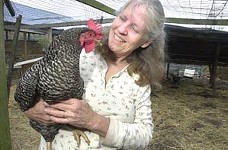Austin's
Good Flow Juice and Honey Co. has provided safe, healthy, nutritious juices to local consumers for 30 years. Currently those consumers are being "protected" from Good Flow's exemplary products by a
U.S. Food and Drug Administration ruling designed to regulate large-scale wholesale juice producers that ship products nationwide. The
Chronicle's Wells Dunbar covered this issue last week ("
Big Brother Puts the Squeeze on Good Flow," News, Sept. 12), interviewing Good Flow owner
Judy Crofut about the dilemma facing her company. There are several distressing aspects of this situation. The FDA's "cease and desist" order that is keeping Good Flow juices off local shelves creates the unfortunate impression that the company's products are dangerous in some way, when nothing could be further from the truth. Much larger local companies such as
Whole Foods Market and
Central Market can prepare and sell fresh, unpasteurized juices every day because they are retailers rather than wholesalers. At this point, Good Flow has three choices: 1) comply with the regulations and pasteurize its juices, compromising valuable bacteria and nutrients in the process; 2) refinance, restructure, and relocate the business to include a retail outlet; or 3) get out of the juice business entirely. Here's hoping Good Flow is able to pull off the second option and that some of Austin's favorite fresh juices are back on the market very soon… The creepiest thing about this whole story is the enforcement of FDA rules meant to regulate major national food producers and factory farms being used to put small artisan-food producers and small farmers out of business. Unfortunately, it brings to mind last year's controversy over the
National Animal Identification System. You remember NAIS, don't you? It's the government's brilliant solution to the threat of mad cow disease and/or avian flu outbreaks: It would require all American livestock (including your pet horse and the chickens in your yard) to be equipped with tracking chips and all livestock owners to notify the government in writing every time they move said livestock from one location to another. It turns out that the cost of implementing and monitoring the NAIS program would be astronomical, and the cost of complying with the program would put many small farmers and ranchers out of business even though they are unlikely to ever be the source of any large-scale disease outbreak. Texas farmers and ranchers against NAIS are currently lobbying their state representatives to pass a bill that would take away the Texas Animal Health Commission's authority to make NAIS mandatory. For more on how to help with that, contact
Judith McGeary at 243-9404 or see
www.farmandranchfreedom.org. Surely there has to be some way to protect our nation's food supply without destroying the freshest, cleanest, and healthiest local sources available to us in the process… This country is facing serious issues of food-supply safety, food security, and the need for equitable, effective farm policy right now. The real irony here is that in this historic, watershed election year, the closest we've seen to a discussion of farm policy is stupid talk about pigs wearing lipstick.









